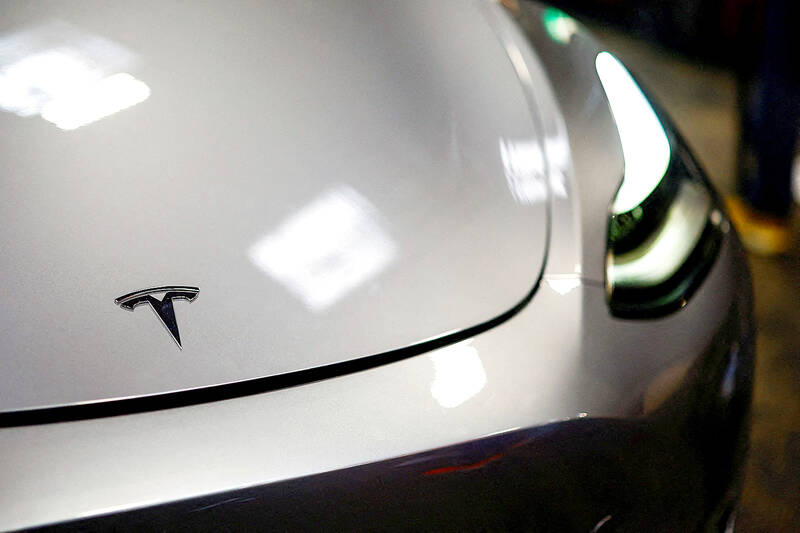Tesla Inc reported its first fall in yearly deliveries yesterday as lucrative year-end incentives for the Elon Musk-led electric vehicle (EV) maker's aging lineup and the new Cybertruck pickup failed to lure customers wary of high borrowing costs.
Musk had earlier predicted "slight growth" in last year's deliveries and offered a range of promotions including interest-free financing and free fast-charging to boost sales.
But reduced European subsidies, a shift in the US toward lower-priced hybrid vehicles and tougher competition especially from China's BYD Co (比亞迪) hurt Tesla.

Photo: Reuters
The US EV maker's shares closed about 6 percent lower.
"Lower deliveries reduces Tesla's growth and lowers the total addressable market for the company's ancillary services, including autonomous driving software, charging, and insurance," Morningstar Inc analyst Seth Goldstein said in a note.
"The slight decline highlights that the current vehicle lineup is nearing market saturation," he added.
As demand for EVs slows, Musk has pivoted his focus on building a self-driving taxi business that is expected to boost Tesla's value.
He also backed US president-elect Donald Trump with millions of dollars in campaign donations and analysts expect easier regulations from the new administration to help Tesla in the long run.
But with self-driving technology still under development and years away from commercialization, analysts have said Tesla would have to rely on its promised cheaper versions of current cars and the success of Cybertruck to achieve Musk's target of 20 percent to 30 percent sales growth this year.
The truck, known for its futuristic design, has been showing signs of weakness in demand. Tesla is yet to disclose the delivery numbers for its Cybertruck.
Tesla is also under pressure from legacy automakers. Its October registrations in Europe fell 24 percent, due to a tight race from Volkswagen Group, whose Skoda Enyaq SUV dethroned Tesla's Model Y as the best-selling EV in the region, according to data research firm JATO Dynamics.
The company said yesterday that it handed over 471,930 Model 3 and Model Y vehicles and 23,640 units of other models, including the Model S sedan, Cybertruck and Model X premium SUV.
Overall, Tesla delivered 495,570 vehicles in the three months to Dec. 31, missing estimates of 503,269 units, according to 15 analysts polled by LSEG Group. It produced 459,445 vehicles in the period, down about 7 percent from a year earlier.
Deliveries totaled 1.79 million last year, 1.1 percenbt lower than the prior year and below estimates of 1.806 million units, according to 19 analysts polled by LSEG.
Tesla's deliveries last year were ahead of BYD, which reported a 12.1 percent rise in sales of battery-electric vehicles to 1.76 million, thanks to competitive prices and a stronger push into Asian and European markets.

Nvidia Corp chief executive officer Jensen Huang (黃仁勳) on Monday introduced the company’s latest supercomputer platform, featuring six new chips made by Taiwan Semiconductor Manufacturing Co (TSMC, 台積電), saying that it is now “in full production.” “If Vera Rubin is going to be in time for this year, it must be in production by now, and so, today I can tell you that Vera Rubin is in full production,” Huang said during his keynote speech at CES in Las Vegas. The rollout of six concurrent chips for Vera Rubin — the company’s next-generation artificial intelligence (AI) computing platform — marks a strategic

REVENUE PERFORMANCE: Cloud and network products, and electronic components saw strong increases, while smart consumer electronics and computing products fell Hon Hai Precision Industry Co (鴻海精密) yesterday posted 26.51 percent quarterly growth in revenue for last quarter to NT$2.6 trillion (US$82.44 billion), the strongest on record for the period and above expectations, but the company forecast a slight revenue dip this quarter due to seasonal factors. On an annual basis, revenue last quarter grew 22.07 percent, the company said. Analysts on average estimated about NT$2.4 trillion increase. Hon Hai, which assembles servers for Nvidia Corp and iPhones for Apple Inc, is expanding its capacity in the US, adding artificial intelligence (AI) server production in Wisconsin and Texas, where it operates established campuses. This

Garment maker Makalot Industrial Co (聚陽) yesterday reported lower-than-expected fourth-quarter revenue of NT$7.93 billion (US$251.44 million), down 9.48 percent from NT$8.76 billion a year earlier. On a quarterly basis, revenue fell 10.83 percent from NT$8.89 billion, company data showed. The figure was also lower than market expectations of NT$8.05 billion, according to data compiled by Yuanta Securities Investment and Consulting Co (元大投顧), which had projected NT$8.22 billion. Makalot’s revenue this quarter would likely increase by a mid-teens percentage as the industry is entering its high season, Yuanta said. Overall, Makalot’s revenue last year totaled NT$34.43 billion, down 3.08 percent from its record NT$35.52

PRECEDENTED TIMES: In news that surely does not shock, AI and tech exports drove a banner for exports last year as Taiwan’s economic growth experienced a flood tide Taiwan’s exports delivered a blockbuster finish to last year with last month’s shipments rising at the second-highest pace on record as demand for artificial intelligence (AI) hardware and advanced computing remained strong, the Ministry of Finance said yesterday. Exports surged 43.4 percent from a year earlier to US$62.48 billion last month, extending growth to 26 consecutive months. Imports climbed 14.9 percent to US$43.04 billion, the second-highest monthly level historically, resulting in a trade surplus of US$19.43 billion — more than double that of the year before. Department of Statistics Director-General Beatrice Tsai (蔡美娜) described the performance as “surprisingly outstanding,” forecasting export growth